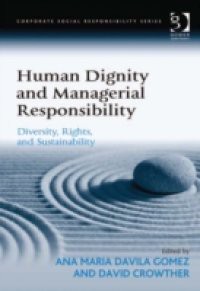The issue of human rights, in the context of corporate social responsibility, is normally taken to relate to concern about exploitation in the supply chain - child labour, slavery in developing countries, and similar evils; but of course, human rights are engaged in relation to the treatment of employees in any work situation. Indeed, as Human Dignity and Managerial Responsibility illustrates, the handling of employees is increasingly recognised as an important ingredient of sustainable enterprise - evidence shows that ethical and socially responsible behaviour is increasingly and successfully being engaged in many large corporations.Much has been written about the responsibilities of managers. Since employees are claimed by all organisations to be among their most important stakeholders it is ironic that research finds that the behaviour of many managers towards employees is often inappropriate. The editors and contributors of Human Dignity and Managerial Responsibility argue that there is a clear connection between maintaining the dignity of the workforce and corporate performance and sustainability. Their multiple perspectives on the workplace examine the position of the employee as a stakeholder, together with issues about managing employees in relation to social responsibility and sustainability. They discuss diversity in the broadest sense, filling a gap in the research-related literature essential to a more rounded understanding of CSR.Human Dignity and Managerial Responsibility will appeal to a wide audience amongst those with an academic or professional interest in CSR, sustainability, governance and stakeholder management, human rights, diversity, human resource management, and organisational development.

